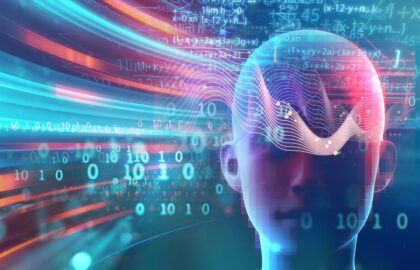The landscape is shifting. The reality is that artificial intelligence (AI) is fundamentally altering everything—upending industries, redefining roles, and transforming how we approach everyday tasks like writing emails and touching up selfies. In the last three years, Generative AI models have advanced significantly, making tools like OpenAI’s ChatGPT accessible to just about everyone for optimizing workflows and enhancing productivity. This integration of AI across such a vast array of platforms signifies a new baseline for business operations and innovation.
It’s hard to miss—almost every headline about tech concerns AI’s potential impact on the future. However, no one has a magic ball to predict the norm of the future. Executives don’t understand AI or their team’s proficiency with AI tools, so they are uncertain about how to implement AI in their organizations. Analysts and futurists are making educated guesses about the effects of AI. Some are predicting the automation of everything. Some are predicting the creation of a new era of human flourishing. It’s confusing, leaving us with significant uncertainty about the potential and limitations of AI technologies and the ways specific industries and jobs may change.
This article discussed the continued importance of software engineering in the AI era and how AI can complement and expand these skills in the coming years.
Is Software Engineering Still a Viable Career Path?
In short, yes. The tech industry is constantly changing and adapting. The creation of personal computers was a massive technological shift that was met with trepidation and concern and resulted in an enormous explosion in products and jobs. Frameworks, testing, and automation techniques have evolved for decades, creating significant productivity gains. The truth is that AI-assisted coding has been available to developers for years, and most of the potential gains of emerging technologies aren’t far out of line with the work that has happened in the past.
Despite all of this, software engineering skills remain essential. The demand for skilled engineers is expected to grow by 25% in the next 5-6 years. That growth is driven by digital transformation and AI integration across all sectors. Software engineering is evolving to accommodate AI, necessitating a shift in skills while remaining foundational to the development of digital products. Its foundational pillars—programming, problem-solving, creativity, and complex system design—are as relevant as ever.
Programming Proficiency & Application Development
The fundamental role of coding in software engineering isn’t likely to change any time soon. Python and JavaScript are pivotal languages that every programmer will need to know. These languages support AI and ML projects and the frameworks that power modern applications.
Python libraries, like TensorFlow, NumPy, Keras, and Scikit-learn, are foundational tools for AI and machine learning development. JavaScript has front-end and back-end development applications through frameworks like Node.js, Vue, and React, bringing AI capabilities to web interfaces. As AI integration deepens, the essence of coding as a skill—conceptualizing and creating digital solutions—will be invaluable. The development of future products will require deep programming and product development knowledge.
We teach these languages in most of our programs because of the popularity and versatility of Python and JavaScript, but they aren’t the only viable options. Languages like Java, PHP, and C# are also highly utilized in modern programs. Whatever language you learn, coding skills transcend specific languages; by learning to code, you learn problem-solving, system design, and adaptability. With AI tools automating tasks and generating code, software engineers can focus on higher-level problem-solving and creativity. This partnership with AI enhances efficiency and highlights the importance of programming knowledge. Engineers need to understand code to oversee AI’s contributions effectively, ensuring applications are efficient, scalable, and ethical.
Understanding AI and ML Principles
Engagement with AI projects is growing—a look at Github’s annual report shows a massive spike in AI-related projects. Developers are adapting to incorporate these new technologies in their toolkits. Software engineers must understand how to integrate AI into their projects, extending beyond traditional applications to include AI-driven functionalities like image recognition and language translation.
Knowledge of AI principles will be critical for addressing complex challenges. Not every engineer will need to be a data scientist, but familiarity with AI and ML concepts will become more essential with time. This knowledge is vital for software engineers in two ways:
- The ability to implement existing AI models. You must know how to use AI tools and incorporate them into products. For example, programming knowledge will help you interact with APIs, but you’ll also need to understand the model parameters and how to tune them to get the output you want. This takes some familiarity with AI concepts and a working knowledge of manipulating models for a desired outcome. Your knowledge of Python and development practices will be helpful here, as many of the most advanced AI and machine learning models are accessible via Python.
- Understanding how these technologies can be leveraged to solve real-world problems. This will soon become a real differentiator. Understanding models well enough to leverage them for specific circumstances will be critical in the future. Most of the recent discussion has been around Generative AI language models. Still, dozens of models exist for specialized purposes and work far better than ChatGPT for solving particular problems. For instance, we could implement a chatbot in a web application. What model should we use? Why that model? How can it be customized for the best user experience? These are the questions that developers will be asked in the future.
Creativity, Problem-solving, and Ethics
As AI becomes more embedded in software development and our everyday lives, the emphasis on ethical considerations and responsible use of AI will be magnified, and unique human skills such as creativity, empathy, and ethics will become more critical. AI can automate tasks, enhance workflow efficiencies, and augment the capabilities of software developers through tools like GitHub Copilot for code suggestions or automated testing and debugging tools. However, the essence of product design and development—understanding user needs and ethical implications, as well as ensuring accessibility—remain deeply human tasks that AI cannot replicate.
This evolving landscape necessitates a collaborative approach, requiring software engineers to work closely with data scientists, ethicists, and other stakeholders to ensure AI is used responsibly and beneficially.
Navigating the Future of Software Engineering with AI
Integrating AI into software engineering is a shift towards a more dynamic, efficient, and innovative approach to technology development. However, the human element is still as relevant today as it was 20 years ago. We may not know what the future holds, but we do know a few things:
- AI is reshaping all industries, not just tech. This means that technical skills will become increasingly important regardless of profession because you’ll need to work with these technologies whether you are a developer or not. Even if you move into another industry—retail, aerospace, medical, finance, etc.—all these industries will soon require some understanding of AI and the skills to work with it.
- Coding is becoming table stakes for everyone. Many middle and high schools in the US already teach some basic coding to prepare learners for a future where all industries are more dependent on a tech-savvy workforce. Prompt engineering, software development, and communication skills will become more valuable over time, so getting a head-start by learning to code is always a solid career choice.
- The world needs intelligent, creative, and informed professionals to create the next generation of technologies. As AI technology becomes more accessible, one’s ability to use AI as a platform for innovation and advancement in all sectors will be the differentiating skill set. The reality is that companies are currently deciding how to optimize their workforces by augmenting current products with AI, but that won’t last long.
Next-Gen AI Tools
The next generation of AI-powered tools and processes will enable the rapid development of new products and experiences. Efficiency gains may help companies in the short term by reducing costs. But, that effect will diminish significantly as product development cycles speed up. To stay competitive, companies must innovate and build products faster and at a higher quality. More products, more experiences, more competition. In the long run, AI will almost certainly create more technical jobs than it will displace. Still, future jobs will require workers to display high efficiency, communication skills, intelligence, and training in multiple technical domains.
Future Roles in Software Engineering with AI Integration
As AI becomes more intertwined with software engineering, new roles may emerge that will displace some traditional programming roles. New roles like Prompt Engineer, AI Quality Assurance Manager, and AI Ethics Officer are emerging and growing in response to the rapid adoption of AI into workflows and product solutions. These roles will also likely adapt with time, so we can’t expect to know the exact titles 5-10 years from now.
However, considering Generative AI’s known capabilities and limitations, we can speculate how it will impact software engineering roles.
- Full-Stack Developer: Developers manage front-end and back-end systems. They write business logic, implement user experiences, and incorporate AI features to enhance user experiences and backend efficiencies. These developers will use languages like Python and JavaScript to develop full-stack products incorporating adaptive content and intelligent data systems. Understanding AI will enable these developers to create more responsive and smart applications.
- Front-end Developer: Front-end developers create the interfaces we interact with every day. They create every page you see on the web with Javascript, HTML, and CSS and build applications using popular frameworks like React, Vue, and Svelt. Front-end developers can leverage user data to create personalized experiences, utilizing AI algorithms to tailor content and interfaces to individual preferences.
- Back-end Developer: These developers create the server applications that talk to other systems and serve content to front-end applications. They build APIs, interact with databases, and make secure web applications by implementing authentication and validation. These developers will increasingly rely on AI for data processing and analysis, optimizing server-side operations, and enabling more sophisticated data-driven functionalities.
The Future is Bright
As AI continues to evolve, so will the roles and skills required in the field. Learning software development will give you many essential skills for the future. You’ll learn to code, work through complex problems, collaborate and communicate with stakeholders, work with AI tools, and start a lifelong growth journey.
Now is the time to embrace a life of continuous learning and ethical considerations that will be essential for those looking to lead the way in this new era. It’s never too late to start coding. We’ll see you at the keyboards!




